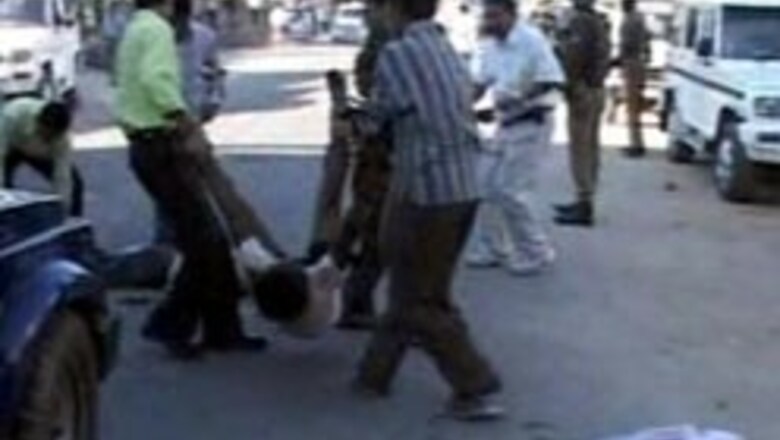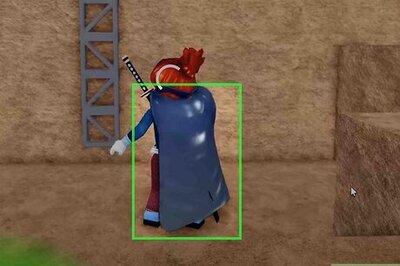
views
 New Delhi: What started as a normal protest by an Adivasi group in Guwahati turned into a tribal-local conflict on Saturday, causing damage to property and life. Is it a new wave of intolerance or opening of old wounds in the conflict-ridden state?
New Delhi: What started as a normal protest by an Adivasi group in Guwahati turned into a tribal-local conflict on Saturday, causing damage to property and life. Is it a new wave of intolerance or opening of old wounds in the conflict-ridden state?
Veteran journalist and Northeast observer Sanjoy Hazarika discussed the issue with readers on IBNLive chatroom on Tuesday. Here we reproduce the unedited text of the chat.
Gagan Chaswal: Why every time Assam becomes a target for all these uncivilized guys there?
Sanjoy Hazarika: Who are you calling 'uncivilized': the people who broke the cars and attacked stores (they were armed with bows and arrows, lathis, when they began their march)? The residents who counter-attacked to retaliate when their cars, shops and individuals were assaulted? The men who stripped the 15-year-old girl, little more than a child? The police who stood by and did not do anything? The politicians who flew in to crow over the misery of others?
The state government which was pontificating about the wonderful situation in Assam at a meeting some distance from the site and had got most of the police there to provide security for its leaders and the International Tea Convention? Or again the government for clearly covering up the death toll in the counter-attacks? There is a lumpenisation in society which has spread across the country and unemployment and local angers feed this descent into chaos.
Guest: Whatever happened, can you entirely blame it on the locals? Is the Govt of Assam not responsible for this?
Sanjoy Hazarika: I think that many sides, not just one or two, are to blame. The government is of course one of them for failing to provide basic security and being unprepared for the initial attacks and then the counter-violence: there was a long gap before any action or that the name was taken.
Anurag K Sharan: Hello Sanjoy, I have a very general question. Nowadays most people in India are working in some other state for better opportunity and it is fairly acceptable across the country, except in Assam. Why do the Assamese feel the other way?
Sanjoy Hazarika: This is a complex issue which merits a slightly longish answer. While this problem is not limited to Assam — please remember the Shiv Sena campaign against non-Maharastrians and similar challenges elsewhere — I recognize the difficulties here. The soaring unemployment rate (nearly 30 lakh unemployed in a state with a population of 3 crore) means that the situation is just made for trouble. There is a feeling that 'locals', though qualified, are not getting the jobs and opportunities they deserve. This resentment has been mobilised by various student groups.
To an extent, this was behind earlier incidents of targeting of job seekers from outside. But we should remember that those who were involved in the armed attacks earlier this year do not represent the people of the state and only an armed organisation. This does not in any way justify the attacks on people from other states. To complicate matters, the tragedy over the weekend involving members of tribes, who work in tea plantations, and local residents pitted people from the same state against each other. The tea garden workers are among the largest ethnic groups in NE India and were transported there by the British under horrible conditions from the present-day Jharkhand and other parts of Central India.
They have been demanding Scheduled Tribe status for a long time. But the Government of Assam, by sending their application as a tea tribe, ensures that they will not get such status: After all, they are Adivasis, Mundas, Santhals and others who are recognised as tribes in their original homeland. So why not extend that recognition to other parts of the country, such as Assam, where they now live and have lived for over a century. The Government of India needs to take simple steps also to assuage their anger and calm the situation. But simply, we in the NE, not just in Assam, need to broaden our minds — and many are doing that by traveling outside and working, studying and living in other parts of the country and the world.
Moramee Baruah: Dear Sanjoy, don't you think the national media is making things worse out of the Saturday's incident? Adivasis were also responsible up to a lot for that tragedy.
Sanjoy Hazarika: Of course, the adivasis were also responsible for the intitial incidents, destroying property and harming ordinary people. The reaction of people was understandable, but going to the extent of beating them to pulp, stripping a young girl is unacceptable. Many innocents on both sides suffered. The media rushing after the story and salivating on it, buying and broadcasting the most horrific images, creating a stunning impact and filling those who watched with anger and shame.
But is the media — and I would suggest you read and watch the local media not the 'national media' — aware of the impact and consequences of spreading these images? They have to be more responsible, I agree. But remember that without that shock treatment, the Assam Government would not have acted so rapidly. Now it's time to also remember those who saved others, who protected them and took them to safety. It's time to write and record their stories too.
Abhishek: The 'caste Hindu' Assamese had always had an uneasy relationship with the other demographic groups in Assam — be it Bengali Hindus in the 1960s and 1970s, the Bodos in the mid-1980s, the other smaller tribes in 1990s and now the adivasis from 2005 onwards. The 'caste Hindu' Assamese have monopolised all power, jobs, government patronage in Assam anyway. What is their problem, Mr Hazarika?
Sanjoy Hazarika: Basically, this is based on the fear of being 'outnumbered' and swamped by outsiders, whether that has a basis in reality or not, one could argue over. But regional groups and parties like the BJP have played to the gallery on this, feeding on these fears and concerns. There are many caste Hindu Assamese who have accepted the circumstances of Assam, but the complexities of Assam's demography defy any quick-fix solution. As far as the Bodos are concerned, despite their long and arduous struggle, they now share political power at the state level and run their own territorial council; often, it's an issue of giving power and money as well as a status to those fighting the system or demanding a right. Delays complicate an already complex situation as we have seen.
Rezaul Laskar: Hi Sanjoyda, Rezaul Laskar from Islamabad. The new violence in Assam seems to be another worrying addition to the mix of complicated politics and insurgency. What implications will it have in the long run? Are we likely to witness further divisions of the society?
Sanjoy Hazarika: Rezaul, I think this is the beginning of another tragic bout of confrontation in the state. It may not happen suddenly, unlike Saturday's violence. But I think that it would be very difficult to heal, especially in the adivasi- dominated areas and other areas where various 'tea tribes' live. It is most urgent that the state government sits down with the leaders of the tribes and also reaches out to those who suffered in the riots, not just by giving compensation but going to their villages and assuaging anger. In addition, those Guwahati residents who suffered cannot be forgotten. They need to be compensated as well. In such tragic situations, it is mostly the innocent who suffer
PAGE_BREAK
Santanu Biswas: Sanjoy, I was there in Assam for last five years. I love Assam and peoples, everyone (outsider of NE ) having some sort of wrong perception that NE means violence, whereas same thing is happening in every corner of the world. Could you please tell why it is so.
Sanjoy Hazarika: There are parts of the NE that are without violence and where people live in amity — parts of Assam, Mizoram and Sikkim, Aruanchal Pradesh and Meghalaya. It is only pockets of Assam and Nagaland and Manipur (and at times Tripura) which are deeply troubled. But both media and governments — and many who depend on both for their information — broad-brush the whole region as 'disturbed and violent'. That's human nature — it's more difficult to analyze issues and break them down than give a simplistic view of things in a few sound bites. Also often we in the region fail to see the image that we are creating of ourselves, an image which gets fixed in the public psyche and media as well. Take bandhs for example. Rarely a day passes without a bandh in one part of the region or the other. And who suffers the most? Students and daily wage earners. While the NE has long been a victim of state and non-state violence, it remains far from the rest of India's mind unless events like these recent tragedies take place — and for that leaders in the media as well as the government are as responsible as anyone else.
Vinodh, UAE: Assamese brothers and sisters are undergoing the trauma of such unrest for a long long time. I think politically we are focusing more on J&K but not on Assam, the other boundary, which is slowly coming into a situation which is beyond control. Don't you think the blame has to be more on the consecutive state and Central governments which have been taking things lightly and thus not playing the role of the government in 'protecting the citizens and civilians' and shouldn’t the home minister and the state government take ultimate responsibility and resign, which will give the public a positive step towards solution.
Sanjoy Hazarika: No one in the government resigns unless they are forced to! But you're right, although the NE has suffered longer and seen greater tragedy and violence that Jammu & Kashmir, Delhi pays attention only when forced to — when it has no choice. I don't think that just blaming goats goes far enough; organised civil society needs to mobilise better and be more pro-active, as it has begun to do.
Radhika:There seem to be more non-Assamese than Assamese in almost all parts of Assam today. Is this a likely reason for the intolerance that we are seeing today? Each group seems to have to fight it out to get even the basic facilities.
Sanjoy Hazarika: I think such a perception is widespread. But the problem is that no one yet in Assam agrees on what the definition of an Assamese is. But it's almost safe to say that in most parts of Assam, every group is almost a minority. Although in some urban areas, things have improved, basic needs still remain distant for many people. Not just in Assam but other parts of the NE which is the slowest growing part of the country in economic terms although at the time of independence, it was among the top.
Bharat: Hi Sanjoy, this is Bharat from London. It was shocking to see the news of an adivasi girl been striped and beaten in public. Apart from the tragic incident which should be strongly condemned, was it right to broadcast such news with graphic display on national news. Will this do the woman any good and to the society? What are your thoughts on this?
Sanjoy Hazarika: As I said earlier, the event was a terrible and unacceptable atrocity. At the same time, the images of this tragedy played a dramatic role in ensuring the arrest of the criminals who harmed her and showed the ugly, seamy side of life in Assam — and what people can do when for some reason, they go berserk. It was also a tragic example of the total failure of government and of the law and order machinery. The girl, in an interview, says she just wants to go home because her parents would be worried and that she had come to see the big city about which she had heard so much. It's a 15-year-old child speaking. I am not in favour of repeated use of such footage and feel that both print and visual media should have behaved with greater responsibility and that the journalists who were filming and reporting on her should have, as human beings and citizens, stopped the horror and behaved as responsible citizens.
Manashi: Hi Sanjoy, the past days' incidents have been very disturbing. I'm a resident of Guwahati. It's quite clear that the general public (both locals and adivasis) have suffered because of dirty politics. As far as I can understand what's going on, the route to all this lies in dividing our present society with reservations and false promises being showered to keep the vote banks. Is this game playing with the public ever going to end? I don't know if you would have the answer to it, but it surely is a serious and grim issue that needs utmost attention and action. What would you like to say on this?
Sanjoy Hazarika: It is not just reservations, but divisions and prejudices in our minds which need to be changed and healed. The first we can protest about or argue against, the latter we can actually do something about.
Revathi Sridharan: Except the political blame-game, does the political parties go deep into the root of the problem and try to solve it Mr Hazarika? Will Rs 1 lac compensation to the victim of strip teasing assuage her? All these mindless violence lead to more complex situations. Why there is no word from the Centre? Why the main political parties don't voice their concern on this issue?
Sanjoy Hazarika: It is useless to expect political parties to show maturity, decency and dignity. I would like Sonia Gandhi to declare her views, for women leaders in her government and party and other parties as well as the PM himself. More than compensation, the girl needs counseling — as do others who were beaten or harmed by either side in the violence.
AK Mohsin: Is this something pre-planned as it happened in Gujarat, where a particular sect was targeted by the government?
Sanjoy Hazarika: This was not pre-planned, but a sudden outburst by one side (the demonstrators) which resulted in a horrible backlash although there are a few conspiracy theories floating about.
Mrinal Talukdar: Why call it tribal versus local violence? It is an one-off incident. Why not see the other side of the story? Was it not that hundred of adivasis were saved by the same locals?
Sanjoy Hazarika: Good point, Mrinal. This is part of a larger complex cauldron that simmers in the region. As I said earlier, media needs to do the stories where people saved others, protected them. The only problem, however, is that I think such incidents may be one-off in Guwahati, but are bound to be repeated in different ways and at different levels elsewhere in the state, especially in the interiors where access is difficult.
Sanjay1: Hi Sanjoy, I read somewhere that Assam was by and large a peaceful state for a long time because there was no feudalism in the state. Do you consider this an advantage for the region vis-à-vis the rest of India?
Sanjoy Hazarika: Assam was and has been largely peaceful for a variety of reasons. Confrontations began in the 1970s and have exacerbated on ethnic, linguistic and religious lines. Violence simmers for a range of complex issues which I have tried to answer or reflect upon in other answers. Social assets have not been converted into economic advantage as the conditions demonstrate.
Dipankar Dasgupta: Hi Sanjay, don't you think that the Cong Govt in Assam is trying to cover up the heinous act by underplaying the incident?
Sanjoy Hazarika: Yes, I agree completely. And trying to send the severely injured back by bus when they were still traumatized was both inhuman and medically unacceptable.
Revathi Sridharan: Mr Hazarika, don't you think that lack of proper education and employment to the adivasis which is the main reason for their disgruntlement? Why not the political parties think of improving their basic requirements and uplift them socially? Requirement of the hour is reservation based on their economic backwardness which has to be wiped out in order to avoid all these untoward shameful incidents. What is your opinion?
Sanjoy Hazarika: The political parties have profited on their poverty. That is why new, more militant groups are springing up among the tea groups, not alone the adivasis, which are rejecting traditional political leaders. Reservations alone will not help; what is needed is a range of participatory interventions that enable people to play a role in improving their own incomes and generate new livelihoods.




















Comments
0 comment